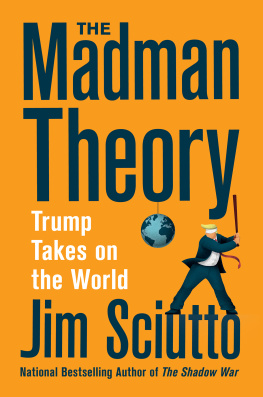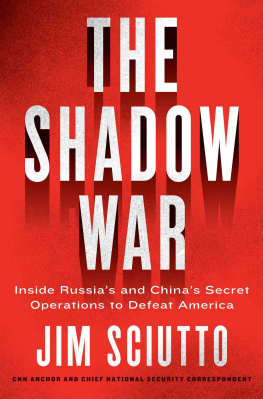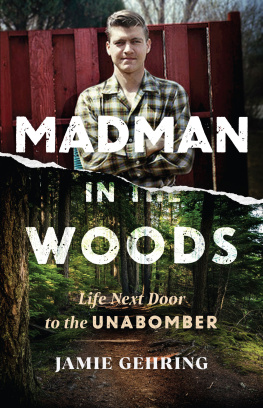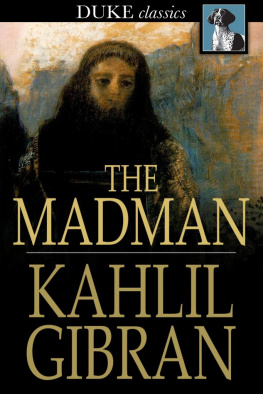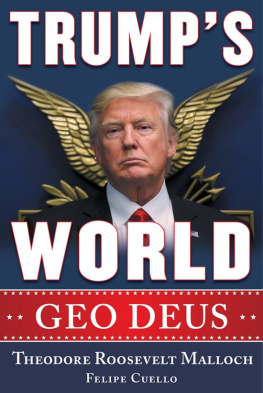Sciutto - Madman Theory : Trump Takes on the World
Here you can read online Sciutto - Madman Theory : Trump Takes on the World full text of the book (entire story) in english for free. Download pdf and epub, get meaning, cover and reviews about this ebook. year: 2020, publisher: HarperCollins, genre: Politics. Description of the work, (preface) as well as reviews are available. Best literature library LitArk.com created for fans of good reading and offers a wide selection of genres:
Romance novel
Science fiction
Adventure
Detective
Science
History
Home and family
Prose
Art
Politics
Computer
Non-fiction
Religion
Business
Children
Humor
Choose a favorite category and find really read worthwhile books. Enjoy immersion in the world of imagination, feel the emotions of the characters or learn something new for yourself, make an fascinating discovery.
Madman Theory : Trump Takes on the World: summary, description and annotation
We offer to read an annotation, description, summary or preface (depends on what the author of the book "Madman Theory : Trump Takes on the World" wrote himself). If you haven't found the necessary information about the book — write in the comments, we will try to find it.
Sciutto: author's other books
Who wrote Madman Theory : Trump Takes on the World? Find out the surname, the name of the author of the book and a list of all author's works by series.
Madman Theory : Trump Takes on the World — read online for free the complete book (whole text) full work
Below is the text of the book, divided by pages. System saving the place of the last page read, allows you to conveniently read the book "Madman Theory : Trump Takes on the World" online for free, without having to search again every time where you left off. Put a bookmark, and you can go to the page where you finished reading at any time.
Font size:
Interval:
Bookmark:
To Gloria, Tristan, Caden, and Sinclair
The Madman Theory
There was a frightening and telling moment in the depths of the Vietnam War when the reeling President Richard Nixon delivered an astonishing order to his national security advisor, Henry Kissinger. Nixon told Kissinger to convey to his North Vietnamese counterparts that he, the president, will stop at nothing if the stalling negotiations between the two sides failed to make progress toward the honorable withdrawal Nixon was seeking. And by stop at nothing, Nixon meantbluntlyto attack North Vietnam with nuclear weapons.
You can say, I cannot control him. Put it that way, Nixon said.
Yeah. And imply that you might use nuclear weapons, Kissinger replied.
Yes, sir, the president answered, specifying even the words Kissinger should use: He will. I just want you to know he is not going to cave.
As matter-of-factly maniacal as this sounds, according to Nixon historian Tim Naftali, President Nixon believed he was acting very reasonably on the wisdom of one of his predecessors, Dwight D. Eisenhower.
Nixons idea wasnt actually his, Naftali explained. It was based on an idea of how the Korean War ended, that Eisenhower hinting that he might use nuclear weapons [against North Korea] encouraged the Chinese to settle.
The trouble is, he added, that there is not much evidence that any such threat from Eisenhower actually helped end the Korean War. Regardless, in 1971, at the height of another war that had already killed tens of thousands of Americans and hundreds of thousands of Vietnamese, the sitting US president deliberately communicated to his adversary that he was just mad enough to launch nuclear weapons.
Nixon and Kissinger decide we have to scare the hell out of the Vietnamese, said Naftali. Nixon believes the North remembers what Eisenhower had done and so he and Kissinger think of this idiotic scare tactic.
In the end, Kissinger did send President Nixons desired warning to the North Vietnamese, but Hanoi did not back down. According to Naftali, seeing their scare tactic wasnt working, Nixon and Kissinger then backed off themselves, and the threat of looming nuclear conflict disappeared.
The theory behind it, however, did not disappear. In fact, in the months and years that followed, Nixon took ownership of what he himself described as the Madman Theory. As Naftali has noted, Nixons chief of staff, H. R. Haldeman, later summarized the theory in his memoir as a threat of egregious military action by an unpredictable U.S. President.
* * *
Nearly fifty years later, a new US president introduced and executed a madman theory of his own. Donald Trump hinted he just might be crazy enough to start a nuclear war, with his infamous fire and fury threat against North Korea and public battle with the North Korean leader over whose nuclear button is bigger. He repeatedly bragged in public of his ability to kill millions of people in Afghanistan. Those were serious moments, when some of his own most senior advisors worried that he might take the country to war, wittingly or unwittingly, despite the fact that he has no real appetite for military conflict; quite the opposite, those same advisors say.
However, Trumps madman is more prolificthe product of his uniquely capricious and unpredictable decision making across the entire spectrum of US foreign policy. This is sometimes by accident and sometimes deliberate. And unlike Nixon, he has unleashed his madman not only on our adversaries but also on our allies and often, according to several senior advisors interviewed for this book, on his own government.
The general concept was discussed, not as a strategy we deliberately adopted, but rather as something we pointed out as a matter of fact, said Mick Mulroy, who served as deputy assistant secretary of defense for the Middle East under former defense secretary James Mattis.
The thing is, it wasnt a ploy, he explained. I think both allies and enemies realize that his decision process was unpredictable even to those advising him up to and including the secretary of defense and national security advisor.
The portrayal of Trump as unpredictablethe madmanis something that permeated official US interactions with the leaders of countries across the globefrom Syria to North Korea to Canada and Mexico to NATO allies.
Joseph Yun, who served as President Trumps special representative for North Korea policy and was thus often the main contact between the Trump administration and both North and South Korean officials, said that in some of the most tense times on the Korean Peninsula, he would tell his counterpartsfranklythat he did not really know what the president would do next.
We used to only think of Kim Jong Un as unpredictable. Now we had Trump as unpredictable, he told me. And I would communicate that.
Trumps madman unnerved even the most senior US officials. Yun recalled that during the worsening standoff with North Korea in 2017, the Pentagon hesitated to give the president a broad range of military options, concerned that he might indeed order a major military attack on the North. You had to be careful what options you gave him, he said. We were being very cautious, because any options you put out there, he could use them.
That frustrated the White House. The White House viewed it as Goddamnit! The president is looking for all options! Yun recalled. But the Pentagon, under Defense Secretary James Mattis at least, didnt budge.
Trumps capriciousness left the advisors responsible for virtually every corner of the globe guessing. I had many meetings where my counterparts would ask, Can we really believe what youre saying? On whose behalf are you speaking? said Fiona Hill, President Trumps former senior director for European and Russian affairs on the National Security Council and key witness during the impeachment investigation of the president in November 2019. This makes the US a capricious partner for anyone who is interacting with us as a collective.
Trumps unpredictability was not a national secret. US adversaries were keenly aware that his own advisors and the institutions and agencies they lead were often in the dark about the presidents intentions and therefore sought to take advantage, said Susan Gordon, who served as principal deputy director of national intelligence, the United States second-highest-ranking intelligence official. Our partners, adversaries, and competitors know we dont know the next play.
With any other president or any other administration, such deliberate unpredictability might be seen as a flaw, identifying it as a criticism. But in the view of Trump and his most devout supporters, his madman is a keen negotiators strength to be lauded. For him, the unpredictability is a card that he liked having, said Yun.
Depending on whom you ask, Trump the madman is either a danger or a secret weapon, brilliant or incompetent, a madman by choice to gain advantage in negotiations, or a madman by accident who overestimates his own abilities and undermines the interests and safety of the nation.
President Trump, in the view of some of his closest advisors, simply knows better.
Look, this foreign policy establishment in this town. They were so elitist, Peter Navarro, Trumps trade advisor, told me. Its like they want to just pat the American citizen and the taxpayer on the head and say, Dont worry, well take care of it. We know better, they say. Its like, No, you dont. You failed on every foreign policy major initiative, in the last thirty years. On China, on NAFTA, on Iraq, on Afghanistan.
And isnt he right? Who can make a convincing argument that the foreign policy establishment, to the extent there is a contiguous group of decision-makers, has gotten the biggest foreign policy decisions entirely or even mostly right in the last several decadeswhether on China, on Russia, on the Iraq War, or on a workable Middle East peace plan?
Font size:
Interval:
Bookmark:
Similar books «Madman Theory : Trump Takes on the World»
Look at similar books to Madman Theory : Trump Takes on the World. We have selected literature similar in name and meaning in the hope of providing readers with more options to find new, interesting, not yet read works.
Discussion, reviews of the book Madman Theory : Trump Takes on the World and just readers' own opinions. Leave your comments, write what you think about the work, its meaning or the main characters. Specify what exactly you liked and what you didn't like, and why you think so.

